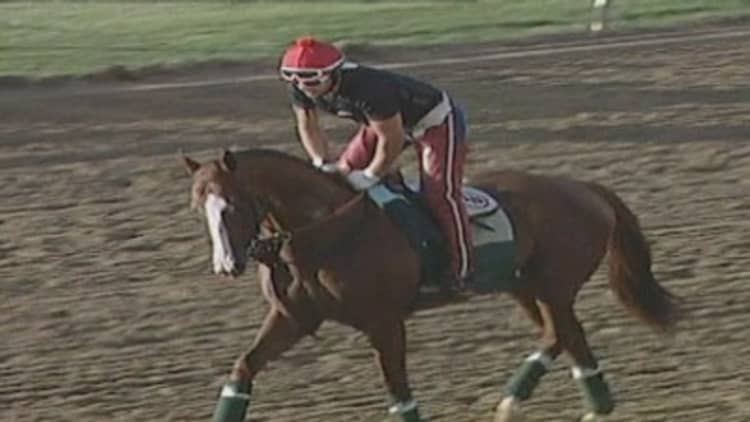California Chrome will be the toast of the horse racing world if he wins the Belmont Stakes on June 7 and becomes the first Triple Crown winner since Affirmed, some 36 years ago.
But the equine industry itself is riding through a rough patch, according to a recently released census from the United States Department of Agriculture.
The U.S. horse population decreased about 10 percent between 2007 and 2012, the USDA said. So too have the number of farms and ranches raising them—with a 12 percent decline over the same time period.
"It's really because of the economy," said James J. Hickey, Jr. president of the industry group, the American Horse Council (AHC). "The horse industry is generally about three years behind other indicators, and we're still catching up to other national impacts, like the stock market, that have somewhat recovered."
Read MoreThe 'Chrome' effect: Belmont prices leap overnight
The bad economy leads to higher expenses when it comes to maintaining the animals, explained Hickey, who added that hay and feed prices have shot up 300 percent for reasons that include the ongoing drought in the Western states.
"The costs of breeding, feeding, housing and even shoeing horses is very high," he said. "This affects the industry."

The USDA conducts its survey every five years to track the equine population.
Though it doesn't account for every horse in the country—there may be as many as 9 million horses in the U.S.—the survey found that the recorded number of horses among ranchers and farmers by 2012 was 3,621,348. That's down from the previous census number of 4,028,827.
The number of farms and ranches with horses, which includes thoroughbred breeding operations, was 504,795 in 2012. That's down from the 2007 census, which counted 575,941 farms. The most common size of farms and ranches with horses was 10 to 49 acres, of which there are some 184,000 out of the total.
Read MoreWhy bet on the Derby when you can own it?
Texas had the greatest population of horses, with 395,818 on some 64,000 farms and ranches. It was followed in number of horses by Oklahoma, California, Kentucky and Florida.
Using figures from its own survey, which go beyond the census, the AHC says that the majority of horses, around 3,906,923, are used for recreation while about 2,718,954 are used for showing, and some 844,531 are used for racing.
$39 billion effect on economy
Horses and their riders create an economic trifecta of products, jobs and spending. The AHC says that the industry has a $39 billion direct effect on the U.S. economy.
That increases to $102 billion when the multiplier effect of spending by industry suppliers and employees is taken into account. The industry also creates around 460,000 full-time jobs.
AHC's Hickey said those figures are lower than they were in years past, showing the effect of the drop in equine numbers.
Meanwhile, an estimated 4.6 million Americans remain involved in the industry as horse owners, service providers, employees and volunteers.
Read MoreCrowning the most social sports teams in the U.S.
And according to the AHC, horses are not only for the wealthy. The group says that approximately 34 percent of horse owners have a household income of less than $50,000 a year, while only 8 percent have annual incomes of more than $100,000.
Hickey said that the industry is not in any kind of panic mode from the drop in equine population, but he added that the AHC's national meeting later next month in Washington D.C, aptly titled "Where Have All the Horses Gone...," will try and sort out the problem.
"We're optimistic about finding a solution, but besides the economy, it could be other reasons," he said. "We just don't know for sure."
—By CNBC's Mark Koba


